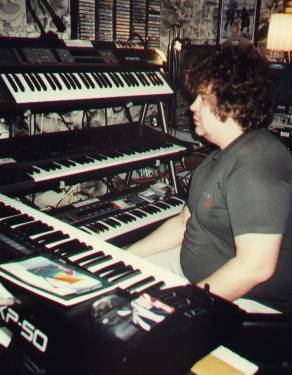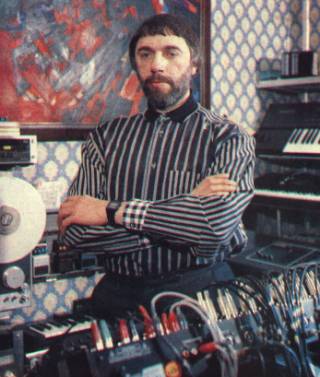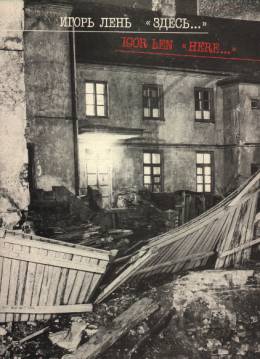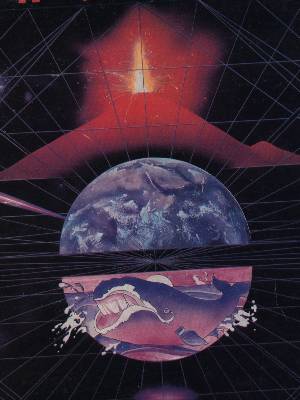THE ELECTRONIC MUSIC
IN EASTER EUROPE
Chapter 2
By: Jorge Munnshe
It is impossible to attempt to compress the musical universe
enclosed behind the iron curtain by decades in a single mini-series. A basic approach to
the reality of the musical avantgardein each one of the multiple, rich cultures of this
great unknown which is Eastern Europe, nowadays in full development, would need the making
of a book. Therefore, this mini-series will only be a brief vision, perforce incomplete,
of these innovative styles sustained on cultures maybe as ancient or even more so than
those in the rest of Europe.
RUSSIA
 Edward
Artemiev is a colossus. He has been doing electronic music for over 30 years. A
mixture of a hippie, intellectual, and artist, he has drunk from the fountains of
scholarly classical music and the most avant-garde Rock. His music has progressed
from the polarity of both trends up to a fusion of world music within the bosom of
electronics, exploring streams that range from cosmic music to unclassifiable sonic
experiences. He is the author of about a hundred and fifty TV and movie soundtracks. He
composed the cantata of the Olympic Games in Moscow in 1980, for a symphonic orchestra,
choirs, a Rock band and synthesizer; a very unorthodox daring for those times and country.
In 1989 he composed a work for the Bicentennial of the French Revolution, commissioned by
the organisers of the Festival of Electronic Music in Bourges. Some of his best known
works are: "The Seven Gates into the World of Satori",
"Mood-Pictures", "The Warmth of the Earth", "Peregrini", and
of course his movie soundtracks for the films of Andrei Tarkovski (on
whose memorial he composed a special theme), as well as those of Andrei
Konchalovski and Nikita Mikhalkov. He alternates his studio work
periods with frequent trips to the international festivals where he is invited as a guest
artist. During the Perestroyka he received some political criticism, mainly from other
musicians, due to the fact that any artist receiving a certain official recognition in the
Communist Era was regarded as a suspect of sympathising with this regime, a fact that
after the fall of communism was taken advantage of on the part of envious, unscrupulous
people who hated the fact that he was the most prestigious electronic musician in his
country, as well as one of the earliest pioneers in the world. These criticisms have no
sense at all, since Edward Artemiev has received honors in several
countries which cannot be considered communist in the least, as for instance the United
States, and he has also been appointed for a variety of important posts, as for example
one in the International Confederation of Electroacoustic Music, of the UNESCO. On the
other hand, as soon as the political situation in Russia made it possible for the full
freedom of movement of its citizens, Artemiev was one of the first to
leave, settling in California, where he began to compose soundtracks for the movie
industry in Hollywood. Nowadays he continues to have a house in Moscow, yet he spends much
of his time abroad.
Edward
Artemiev is a colossus. He has been doing electronic music for over 30 years. A
mixture of a hippie, intellectual, and artist, he has drunk from the fountains of
scholarly classical music and the most avant-garde Rock. His music has progressed
from the polarity of both trends up to a fusion of world music within the bosom of
electronics, exploring streams that range from cosmic music to unclassifiable sonic
experiences. He is the author of about a hundred and fifty TV and movie soundtracks. He
composed the cantata of the Olympic Games in Moscow in 1980, for a symphonic orchestra,
choirs, a Rock band and synthesizer; a very unorthodox daring for those times and country.
In 1989 he composed a work for the Bicentennial of the French Revolution, commissioned by
the organisers of the Festival of Electronic Music in Bourges. Some of his best known
works are: "The Seven Gates into the World of Satori",
"Mood-Pictures", "The Warmth of the Earth", "Peregrini", and
of course his movie soundtracks for the films of Andrei Tarkovski (on
whose memorial he composed a special theme), as well as those of Andrei
Konchalovski and Nikita Mikhalkov. He alternates his studio work
periods with frequent trips to the international festivals where he is invited as a guest
artist. During the Perestroyka he received some political criticism, mainly from other
musicians, due to the fact that any artist receiving a certain official recognition in the
Communist Era was regarded as a suspect of sympathising with this regime, a fact that
after the fall of communism was taken advantage of on the part of envious, unscrupulous
people who hated the fact that he was the most prestigious electronic musician in his
country, as well as one of the earliest pioneers in the world. These criticisms have no
sense at all, since Edward Artemiev has received honors in several
countries which cannot be considered communist in the least, as for instance the United
States, and he has also been appointed for a variety of important posts, as for example
one in the International Confederation of Electroacoustic Music, of the UNESCO. On the
other hand, as soon as the political situation in Russia made it possible for the full
freedom of movement of its citizens, Artemiev was one of the first to
leave, settling in California, where he began to compose soundtracks for the movie
industry in Hollywood. Nowadays he continues to have a house in Moscow, yet he spends much
of his time abroad.
 Artemiy Artemiev,
the son of Edward Artemiev, is another composer with a noteworthy work in
the field of electronic music. Born in 1966, his activities are tightly related to the
cinema industry, television and theatre. Since 1989, he has composed the music for over 60
Russian productions (television, theatre, radio...). He began his career as a keyboardist
for several Moscow rock bands. In 1987 he started to experiment with sound as well as the
possibilities offered by synthesizers, samplers and computers. In 1996 he began to produce
the television programme "Electroshock", devoted to electronic music,
electroacoustics, experimental and avantgarde. In 1997 he became a member of the Russian
Association of Electroacoustic Music. Also in 1997, together with his friend the producer
and film director Vladimir Krupnitskiy, he founded the label
Electroshock Records. He was one of the participants in the 1997 edition of the
Electroacoustic Music Festival in Bourges, held from May 30 to June 8 in France.
Artemiy Artemiev,
the son of Edward Artemiev, is another composer with a noteworthy work in
the field of electronic music. Born in 1966, his activities are tightly related to the
cinema industry, television and theatre. Since 1989, he has composed the music for over 60
Russian productions (television, theatre, radio...). He began his career as a keyboardist
for several Moscow rock bands. In 1987 he started to experiment with sound as well as the
possibilities offered by synthesizers, samplers and computers. In 1996 he began to produce
the television programme "Electroshock", devoted to electronic music,
electroacoustics, experimental and avantgarde. In 1997 he became a member of the Russian
Association of Electroacoustic Music. Also in 1997, together with his friend the producer
and film director Vladimir Krupnitskiy, he founded the label
Electroshock Records. He was one of the participants in the 1997 edition of the
Electroacoustic Music Festival in Bourges, held from May 30 to June 8 in France.
Anton Batagov combines his activity as a composer
with that of a piano performer. In the latter capacity, the one that has made him most
popular indeed, his concerts have tended towards avantgarde music near to New Age or
Minimalist styles. He has been one of the earliest Russian pianist to divulge the works of
Philip Glass, Steve Reich and Morton Feldmann in his
country.
 Boris DeArt is a
composer from Moscow with a background of a scholarly classical education as well as Jazz,
which he is currently complementing with his studies as a sound engineer. He is very well
regarded. Listening to his enigmatic music, the first thing the listener becomes aware of
is the complete cultural isolation the Eastern European artists used to be educated in.
Their music has nothing similar at all to what has been going on in the Western countries.
It looks as if a different evolution had taken place starting from the orchestral music of
the 1930s. Nevertheless, he uses the same Japanese synthesizers available to any Western
musician. Guitarist Oleg Ivanin sometimes colaborates with him.
Boris DeArt is a
composer from Moscow with a background of a scholarly classical education as well as Jazz,
which he is currently complementing with his studies as a sound engineer. He is very well
regarded. Listening to his enigmatic music, the first thing the listener becomes aware of
is the complete cultural isolation the Eastern European artists used to be educated in.
Their music has nothing similar at all to what has been going on in the Western countries.
It looks as if a different evolution had taken place starting from the orchestral music of
the 1930s. Nevertheless, he uses the same Japanese synthesizers available to any Western
musician. Guitarist Oleg Ivanin sometimes colaborates with him.
Another Moscow-based musician is Mijail Chekalin,
colloquially described by his colleagues as "the man who always keeps borrowing for a
night the synthesizers belonging to others". Chekalin develops his
main musical activity in setting music to exhibitions of avantgarde painters, yet he has
also released some albums.
Uri Kassyanik is a very peculiar artist, quite
difficult to classify. Although most of his work belongs to the field of New Music and
that of Electroacoustics, he has also explored such styles as Jazz, Cosmic Music,
and numerous experimental paths. The most remarkable trait in the artistic approach
utilized by Kassyanik in his musical activity is the great
importance he attaches to improvisation. There are many artists who improvise and release
their improvisations more or less redone. However, with respect to Kassyanik,
this trait reaches an unprecedented degree. He conceives his musical production as an
almost exclusively improvising exercise, up to a point that he defends the idea that, at
least as far as he is concerned, improvisation surpasses the possibilities of the pieces
elaborated in the traditional method of composition. Kassyanik even
utilizes the definition of "improphonies" to differentiate his improvised works
from conventional symphonies.
 Vladimir Martinov has combined
the most ancient with the most modern, in a career initiated in the late 1960s. Having
studied the piano and composition at the conservatory of Moscow, he soon placed himself in
the sphere of musical avantgarde, participating in festivals and similar events.
Interested in the ethnic musics, he travelled a lot so as to contact firsthand the
folklores from various regions. In 1973 he began to work in electronic music. Two years
later he led the rock band Outpost, and at the same time he released a
series of European polyphonic music series of the fourteenth to sixteenth centuries, later
followed by other works of reconstruction or re-creation, such as his "Missa
Russica" (1992) based on the Russian musical liturgy of a thousand years ago.
Vladimir Martinov has combined
the most ancient with the most modern, in a career initiated in the late 1960s. Having
studied the piano and composition at the conservatory of Moscow, he soon placed himself in
the sphere of musical avantgarde, participating in festivals and similar events.
Interested in the ethnic musics, he travelled a lot so as to contact firsthand the
folklores from various regions. In 1973 he began to work in electronic music. Two years
later he led the rock band Outpost, and at the same time he released a
series of European polyphonic music series of the fourteenth to sixteenth centuries, later
followed by other works of reconstruction or re-creation, such as his "Missa
Russica" (1992) based on the Russian musical liturgy of a thousand years ago.
Igor Len was the keyboardist of the band Nikolay
Kopernik, and collaborated with the orchestral-Rock macroconcerts by Edward
Artemiev. In the early 1990s he became known at a more international level thanks
to his first solo album, devoted to Russian poet Arseniy Tarkovski and to
his son Andrei (the well known movie maker). The music by Igor Len, based
on the guitar and synthesizers, can be classified as New Age, with a touch of Russian Vangelis
on a mystic plane.
 Previous Page (Articles/News)
Previous Page (Articles/News)
 Edward
Artemiev is a colossus. He has been doing electronic music for over 30 years. A
mixture of a hippie, intellectual, and artist, he has drunk from the fountains of
scholarly classical music and the most avant-garde Rock. His music has progressed
from the polarity of both trends up to a fusion of world music within the bosom of
electronics, exploring streams that range from cosmic music to unclassifiable sonic
experiences. He is the author of about a hundred and fifty TV and movie soundtracks. He
composed the cantata of the Olympic Games in Moscow in 1980, for a symphonic orchestra,
choirs, a Rock band and synthesizer; a very unorthodox daring for those times and country.
In 1989 he composed a work for the Bicentennial of the French Revolution, commissioned by
the organisers of the Festival of Electronic Music in Bourges. Some of his best known
works are: "The Seven Gates into the World of Satori",
"Mood-Pictures", "The Warmth of the Earth", "Peregrini", and
of course his movie soundtracks for the films of Andrei Tarkovski (on
whose memorial he composed a special theme), as well as those of Andrei
Konchalovski and Nikita Mikhalkov. He alternates his studio work
periods with frequent trips to the international festivals where he is invited as a guest
artist. During the Perestroyka he received some political criticism, mainly from other
musicians, due to the fact that any artist receiving a certain official recognition in the
Communist Era was regarded as a suspect of sympathising with this regime, a fact that
after the fall of communism was taken advantage of on the part of envious, unscrupulous
people who hated the fact that he was the most prestigious electronic musician in his
country, as well as one of the earliest pioneers in the world. These criticisms have no
sense at all, since Edward Artemiev has received honors in several
countries which cannot be considered communist in the least, as for instance the United
States, and he has also been appointed for a variety of important posts, as for example
one in the International Confederation of Electroacoustic Music, of the UNESCO. On the
other hand, as soon as the political situation in Russia made it possible for the full
freedom of movement of its citizens, Artemiev was one of the first to
leave, settling in California, where he began to compose soundtracks for the movie
industry in Hollywood. Nowadays he continues to have a house in Moscow, yet he spends much
of his time abroad.
Edward
Artemiev is a colossus. He has been doing electronic music for over 30 years. A
mixture of a hippie, intellectual, and artist, he has drunk from the fountains of
scholarly classical music and the most avant-garde Rock. His music has progressed
from the polarity of both trends up to a fusion of world music within the bosom of
electronics, exploring streams that range from cosmic music to unclassifiable sonic
experiences. He is the author of about a hundred and fifty TV and movie soundtracks. He
composed the cantata of the Olympic Games in Moscow in 1980, for a symphonic orchestra,
choirs, a Rock band and synthesizer; a very unorthodox daring for those times and country.
In 1989 he composed a work for the Bicentennial of the French Revolution, commissioned by
the organisers of the Festival of Electronic Music in Bourges. Some of his best known
works are: "The Seven Gates into the World of Satori",
"Mood-Pictures", "The Warmth of the Earth", "Peregrini", and
of course his movie soundtracks for the films of Andrei Tarkovski (on
whose memorial he composed a special theme), as well as those of Andrei
Konchalovski and Nikita Mikhalkov. He alternates his studio work
periods with frequent trips to the international festivals where he is invited as a guest
artist. During the Perestroyka he received some political criticism, mainly from other
musicians, due to the fact that any artist receiving a certain official recognition in the
Communist Era was regarded as a suspect of sympathising with this regime, a fact that
after the fall of communism was taken advantage of on the part of envious, unscrupulous
people who hated the fact that he was the most prestigious electronic musician in his
country, as well as one of the earliest pioneers in the world. These criticisms have no
sense at all, since Edward Artemiev has received honors in several
countries which cannot be considered communist in the least, as for instance the United
States, and he has also been appointed for a variety of important posts, as for example
one in the International Confederation of Electroacoustic Music, of the UNESCO. On the
other hand, as soon as the political situation in Russia made it possible for the full
freedom of movement of its citizens, Artemiev was one of the first to
leave, settling in California, where he began to compose soundtracks for the movie
industry in Hollywood. Nowadays he continues to have a house in Moscow, yet he spends much
of his time abroad. Artemiy Artemiev,
the son of Edward Artemiev, is another composer with a noteworthy work in
the field of electronic music. Born in 1966, his activities are tightly related to the
cinema industry, television and theatre. Since 1989, he has composed the music for over 60
Russian productions (television, theatre, radio...). He began his career as a keyboardist
for several Moscow rock bands. In 1987 he started to experiment with sound as well as the
possibilities offered by synthesizers, samplers and computers. In 1996 he began to produce
the television programme "Electroshock", devoted to electronic music,
electroacoustics, experimental and avantgarde. In 1997 he became a member of the Russian
Association of Electroacoustic Music. Also in 1997, together with his friend the producer
and film director Vladimir Krupnitskiy, he founded the label
Electroshock Records. He was one of the participants in the 1997 edition of the
Electroacoustic Music Festival in Bourges, held from May 30 to June 8 in France.
Artemiy Artemiev,
the son of Edward Artemiev, is another composer with a noteworthy work in
the field of electronic music. Born in 1966, his activities are tightly related to the
cinema industry, television and theatre. Since 1989, he has composed the music for over 60
Russian productions (television, theatre, radio...). He began his career as a keyboardist
for several Moscow rock bands. In 1987 he started to experiment with sound as well as the
possibilities offered by synthesizers, samplers and computers. In 1996 he began to produce
the television programme "Electroshock", devoted to electronic music,
electroacoustics, experimental and avantgarde. In 1997 he became a member of the Russian
Association of Electroacoustic Music. Also in 1997, together with his friend the producer
and film director Vladimir Krupnitskiy, he founded the label
Electroshock Records. He was one of the participants in the 1997 edition of the
Electroacoustic Music Festival in Bourges, held from May 30 to June 8 in France. Boris DeArt is a
composer from Moscow with a background of a scholarly classical education as well as Jazz,
which he is currently complementing with his studies as a sound engineer. He is very well
regarded. Listening to his enigmatic music, the first thing the listener becomes aware of
is the complete cultural isolation the Eastern European artists used to be educated in.
Their music has nothing similar at all to what has been going on in the Western countries.
It looks as if a different evolution had taken place starting from the orchestral music of
the 1930s. Nevertheless, he uses the same Japanese synthesizers available to any Western
musician. Guitarist Oleg Ivanin sometimes colaborates with him.
Boris DeArt is a
composer from Moscow with a background of a scholarly classical education as well as Jazz,
which he is currently complementing with his studies as a sound engineer. He is very well
regarded. Listening to his enigmatic music, the first thing the listener becomes aware of
is the complete cultural isolation the Eastern European artists used to be educated in.
Their music has nothing similar at all to what has been going on in the Western countries.
It looks as if a different evolution had taken place starting from the orchestral music of
the 1930s. Nevertheless, he uses the same Japanese synthesizers available to any Western
musician. Guitarist Oleg Ivanin sometimes colaborates with him. Vladimir Martinov has combined
the most ancient with the most modern, in a career initiated in the late 1960s. Having
studied the piano and composition at the conservatory of Moscow, he soon placed himself in
the sphere of musical avantgarde, participating in festivals and similar events.
Interested in the ethnic musics, he travelled a lot so as to contact firsthand the
folklores from various regions. In 1973 he began to work in electronic music. Two years
later he led the rock band Outpost, and at the same time he released a
series of European polyphonic music series of the fourteenth to sixteenth centuries, later
followed by other works of reconstruction or re-creation, such as his "Missa
Russica" (1992) based on the Russian musical liturgy of a thousand years ago.
Vladimir Martinov has combined
the most ancient with the most modern, in a career initiated in the late 1960s. Having
studied the piano and composition at the conservatory of Moscow, he soon placed himself in
the sphere of musical avantgarde, participating in festivals and similar events.
Interested in the ethnic musics, he travelled a lot so as to contact firsthand the
folklores from various regions. In 1973 he began to work in electronic music. Two years
later he led the rock band Outpost, and at the same time he released a
series of European polyphonic music series of the fourteenth to sixteenth centuries, later
followed by other works of reconstruction or re-creation, such as his "Missa
Russica" (1992) based on the Russian musical liturgy of a thousand years ago.